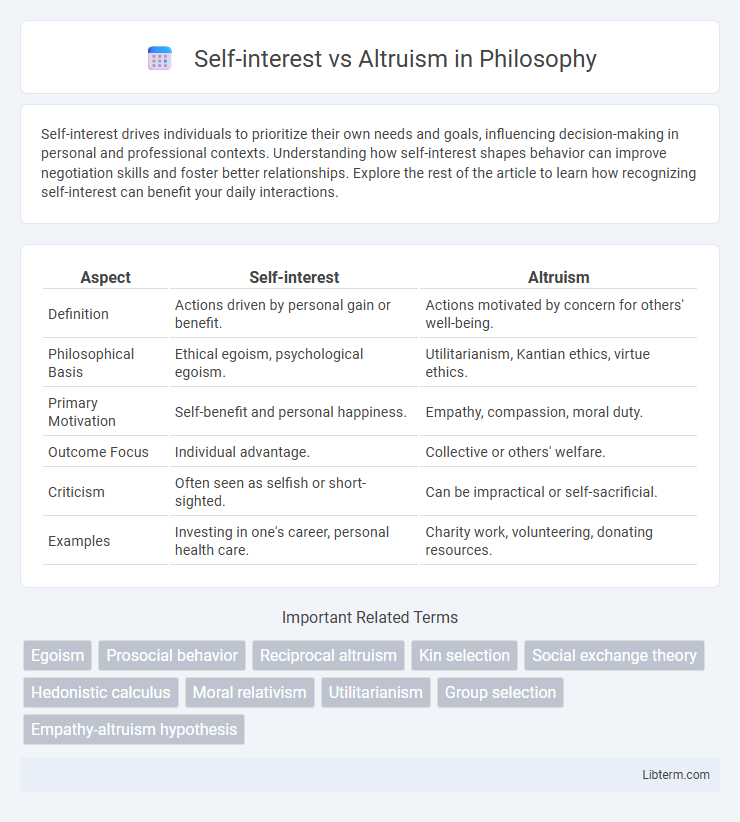Self-interest drives individuals to prioritize their own needs and goals, influencing decision-making in personal and professional contexts. Understanding how self-interest shapes behavior can improve negotiation skills and foster better relationships. Explore the rest of the article to learn how recognizing self-interest can benefit your daily interactions.
Table of Comparison
| Aspect | Self-interest | Altruism |
|---|---|---|
| Definition | Actions driven by personal gain or benefit. | Actions motivated by concern for others' well-being. |
| Philosophical Basis | Ethical egoism, psychological egoism. | Utilitarianism, Kantian ethics, virtue ethics. |
| Primary Motivation | Self-benefit and personal happiness. | Empathy, compassion, moral duty. |
| Outcome Focus | Individual advantage. | Collective or others' welfare. |
| Criticism | Often seen as selfish or short-sighted. | Can be impractical or self-sacrificial. |
| Examples | Investing in one's career, personal health care. | Charity work, volunteering, donating resources. |
Understanding Self-Interest: Definition and Origins
Self-interest refers to actions motivated by personal benefit, rooted in psychological theories like rational choice and evolutionary biology. This concept explains behavior through the lens of maximizing individual utility, often linked to survival and reproduction instincts. Understanding its origins involves exploring economic models and social psychology, highlighting how self-interest drives decision-making and interpersonal interactions.
Altruism Explained: Motivations and Types
Altruism involves acting with the primary goal of benefiting others without expecting personal gain, driven by intrinsic motivations such as empathy, moral values, or social responsibility. Types of altruism include kin altruism, which prioritizes relatives, reciprocal altruism aiming for mutual benefit over time, and pure altruism characterized by selfless concern for strangers. Understanding these motivations reveals complex psychological and evolutionary mechanisms underlying altruistic behavior.
Historical Perspectives on Self-Interest and Altruism
Historical perspectives on self-interest and altruism reveal a complex interplay between individual motivations and social ethics. Philosophers like Hobbes emphasized self-interest as the driving force behind human behavior, while thinkers such as Kant advocated for altruism grounded in moral duty. The evolution from classical economic theories prioritizing rational self-interest to contemporary views integrating altruistic behavior demonstrates shifting paradigms in understanding human nature and societal cohesion.
Evolutionary Psychology: Why Do We Help Others?
Evolutionary psychology explains helping behavior through the concept of inclusive fitness, where individuals support relatives to ensure the survival of shared genes. Reciprocal altruism further promotes cooperation by benefiting individuals who help others with the expectation of future assistance. These mechanisms reveal that seemingly altruistic actions are often rooted in self-interest to increase genetic survival and social advantage.
The Role of Culture in Shaping Altruism and Self-Interest
Culture profoundly influences the balance between self-interest and altruism, shaping social norms and values that prioritize collective well-being or individual achievement. In collectivist cultures, altruism is often emphasized through communal responsibilities and interdependence, fostering cooperative behaviors and social harmony. Conversely, individualistic cultures tend to promote self-interest by valuing personal goals and autonomy, which can lead to competitive and self-focused actions.
Self-Interest in Modern Society: Benefits and Pitfalls
Self-interest in modern society drives innovation, economic growth, and personal achievement by motivating individuals to pursue goals that enhance their well-being and financial stability. However, excessive self-interest can lead to social fragmentation, environmental degradation, and inequities as collective needs are overlooked in favor of individual gains. Balancing self-interest with ethical considerations and community responsibility remains essential for sustainable societal progress.
Altruism in Action: Real-World Examples and Case Studies
Altruism in action is evident in community-driven disaster relief efforts where volunteers provide aid without expecting compensation, emphasizing selfless service. Case studies on organ donation programs highlight increased donor registrations when altruistic motivations are emphasized over personal gain. Real-world examples such as charitable foundations funding education in underprivileged areas demonstrate how altruism fosters social welfare and sustainable development.
The Balance Between Self-Care and Selflessness
Balancing self-interest and altruism requires recognizing the importance of self-care as a foundation for sustainable giving. Prioritizing one's own physical and mental well-being enhances the capacity to support others effectively. Integrating selflessness with self-care fosters resilience and prevents burnout, promoting long-term altruistic engagement.
Ethical Dilemmas: When Self-Interest Conflicts with Altruism
Ethical dilemmas arise when self-interest conflicts with altruism, posing challenges in decision-making processes. Individuals often weigh personal benefits against the moral imperative to act for others' welfare, leading to complex choices in areas like healthcare, business, and public policy. Balancing these competing motivations requires critical ethical frameworks such as utilitarianism, deontology, and virtue ethics to navigate conflicting priorities effectively.
Cultivating Altruism: Strategies for Personal and Social Growth
Cultivating altruism involves intentional practices such as empathy training, mindfulness meditation, and engaging in prosocial behaviors that enhance both personal well-being and social cohesion. Research in positive psychology highlights that altruistic actions activate reward centers in the brain, promoting sustained prosocial motivation and emotional resilience. Social programs integrating volunteerism and community service demonstrate measurable improvements in collective trust and societal health outcomes.
Self-interest Infographic

 libterm.com
libterm.com